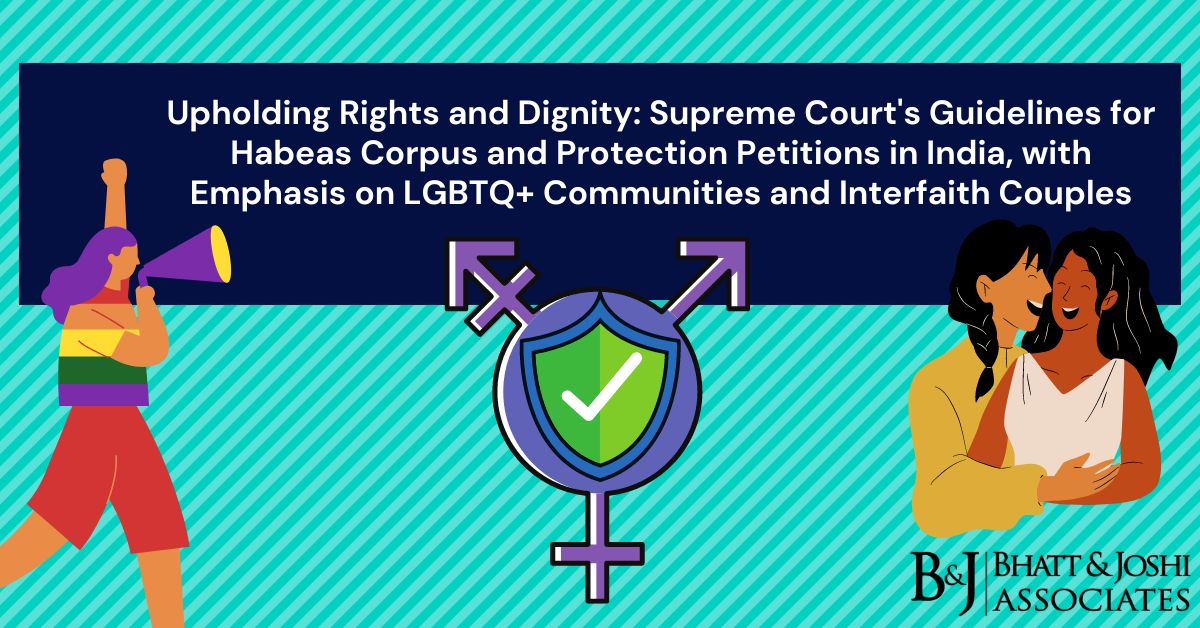LGBTQ+ Communities and Interfaith Couples: Upholding Rights and Dignity Through Supreme Court’s Guidelines for Habeas Corpus and Protection Petitions in India
Introduction
In a society where individual rights are paramount, the legal system plays a crucial role in safeguarding the dignity and freedoms of all citizens. However, marginalized communities, such as LGBTQ+ individuals and interfaith couples, often face unique challenges within the judicial process. Recognizing this, the Supreme Court of India recently issued comprehensive guidelines for High Courts to follow when handling habeas corpus petitions and petitions seeking police protection, particularly concerning LGBTQ+ individuals and interfaith couples. This essay aims to explore the significance of these guidelines, their implications for marginalized communities, and the broader societal impact of upholding dignity and rights within the legal system.
Historical Context: LGBTQ+ Communities and Interfaith Couples’ Rights in India
Before delving into the specifics of the Supreme Court’s guidelines, it is essential to provide a brief historical overview of LGBTQ+ rights in India. For decades, LGBTQ+ individuals in India faced discrimination, harassment, and legal persecution due to colonial-era laws criminalizing homosexual acts. The landmark case of Navtej Singh Johar v. Union of India in 2018 marked a significant turning point when the Supreme Court decriminalized consensual same-sex relations, affirming the rights and dignity of LGBTQ+ individuals.
The Kerala High Court Case: Catalyst for Change
The genesis of the Supreme Court’s guidelines can be traced back to a petition filed against a Kerala High Court ruling. In this case, the High Court, while considering a habeas corpus petition, directed the alleged lesbian partner of the petitioner to undergo counseling. This directive sparked controversy and prompted the Supreme Court to intervene, recognizing the broader issues at play regarding LGBTQ+ rights and judicial conduct.
Understanding Habeas Corpus and Protection Petitions
Before delving into the specifics of the guidelines, it is essential to understand the nature of habeas corpus petitions and protection petitions. Habeas corpus petitions are legal actions through which individuals can challenge their unlawful detention or imprisonment. On the other hand, protection petitions are filed by individuals seeking police protection due to perceived threats or risks to their safety, often in cases of interfaith or LGBTQ+ relationships where familial or societal opposition exists.
Key Principles of the Supreme Court’s Guidelines
The guidelines issued by the Supreme Court encompass a wide range of principles aimed at ensuring an empathetic, respectful, and rights-oriented approach by the judiciary. These principles include:
- Prioritization and Timely Adjudication: The guidelines emphasize the importance of prioritizing habeas corpus and protection petitions, ensuring swift and timely adjudication to prevent undue delays and further harm to the individuals involved.
- Respect for Privacy and Dignity: Central to the guidelines is the recognition of the right to privacy and dignity of individuals, particularly LGBTQ+ individuals and interfaith couples. Courts are instructed to create a safe and respectful environment, respecting preferred names and pronouns, and refraining from passing judgment based on sexual orientation or gender identity.
- Non-Interference with Personal Choices: The guidelines explicitly prohibit courts from attempting to influence or change individuals’ sexual orientation, gender identity, or personal choices through counseling or other means. This directive aims to protect individuals from conversion therapy and uphold their autonomy and self-determination.
- Protection and Safety Measures: Recognizing the vulnerability of LGBTQ+ individuals and interfaith couples to violence and discrimination, the guidelines stress the importance of granting immediate protection measures, such as police protection, without requiring individuals to prove grave risks of harm.
- Elimination of Bias and Discrimination: The guidelines underscore the judiciary’s responsibility to eliminate bias, discrimination, and prejudice within legal proceedings. Courts are instructed to adopt a neutral stance, eschewing any queerphobic or transphobic conduct or remarks by court staff, lawyers, or parties involved.
Implications for LGBTQ+ Communities and Interfaith Couples
The Supreme Court’s guidelines have significant implications for LGBTQ+ communities and interfaith couples in India. By prioritizing empathy, dignity, and respect within the legal system, these guidelines signal a fundamental shift towards greater recognition and protection of the rights of marginalized groups. LGBTQ+ individuals and interfaith couples can now expect a more supportive and rights-oriented approach from the judiciary, reducing the barriers they face in accessing justice and protection.
Challenges and Opportunities for LGBTQ+ Communities and Interfaith Couples in Implementation
While the issuance of guidelines is a positive step towards protecting the rights and dignity of marginalized communities, their effective implementation poses challenges. Ensuring that judges and legal practitioners adhere to these guidelines requires comprehensive training, awareness-raising, and institutional reforms within the judiciary. Additionally, societal attitudes and biases towards LGBTQ+ individuals and interfaith couples may present obstacles to the full realization of these guidelines in practice.
Broader Societal Impact
Beyond the realm of the legal system, the Supreme Court’s guidelines have broader societal implications. By affirming the rights and dignity of LGBTQ+ individuals and interfaith couples, these guidelines contribute to a more inclusive and equitable society. They challenge entrenched stereotypes, promote acceptance and understanding, and pave the way for greater social change and progress towards equality for all.
Conclusion: Towards a More Just and Inclusive Society
In conclusion, the Supreme Court’s guidelines for habeas corpus and protection petitions represent a significant milestone in the journey towards justice and equality in India. By prioritizing empathy, dignity, and respect within the legal system, these guidelines uphold the fundamental rights of marginalized communities, including LGBTQ+ individuals and interfaith couples. While challenges remain in their implementation, the issuance of these guidelines sends a powerful message of inclusivity and reaffirms India’s commitment to upholding the rights and dignity of all its citizens.










